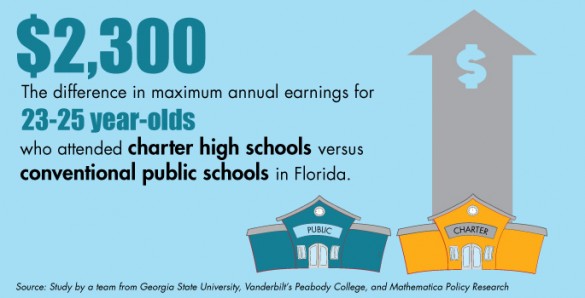
Students who attend charter high schools are more likely to graduate, go to college and stay in college than students who attend traditional public high schools.
This is according to the first large-scale study of the effects of charter schools on earnings in adulthood, conducted by researchers at Vanderbilt University’s Peabody College of education and human development, Georgia State University and Mathematica Policy Research.The full results were published today in the Journal of Policy Analysis and Management.

“Maximum annual earnings were approximately $2,300 higher for 23- to 25-year-olds who attended charter high schools versus conventional public schools across the state of Florida,” said Ron Zimmer, associate professor of public policy and education and director of graduate studies at Peabody.
“We also found that students who attended charter high schools were more likely to attend a two- or four-year college by an estimated nine percentage points.”
Research in this area has focused primarily on the short-term effects of student test scores, which may not capture the full impact of charter schools on students, according to Tim Sass, Distinguished University Professor at Florida State University’s Andrew Young School of Policy Studies.
“We decided to examine longer-term outcomes like high school graduation, college enrollment and completion and earnings, because these may have a greater lifetime consequence than test scores.”
The researchers found the positive relationships between charter high school attendance and long-term outcomes striking. Most studies in this field have found little to suggest that charter schools promote positive test scores, on average, across an entire state, even though some charter schools produce substantial test-score gains.
The new study suggests the possibility that charter high schools are endowing their students with skills that test scores do not capture, like those that promote success in college and career.
“Perhaps charter schools are trying to focus on promoting life skills like grit, persistence, self-control and conscientiousness. But more research would be needed to test this hypothesis,” said Zimmer.
Early evidence of the positive effects high school charter school students receive in educational attainment and earnings in adulthood raises the question whether the full, long-term impact of these schools have been underestimated by studies that examine only test scores.
“Our findings suggest that research conducted to examine the efficacy of education programs should examine a broader array of outcomes than just test scores,” the authors conclude.
Collaborators include Brian Gill and Kevin Booker of Mathematica Policy Research. The study was funded by the Joyce Foundation.